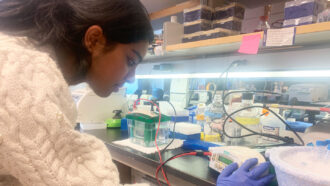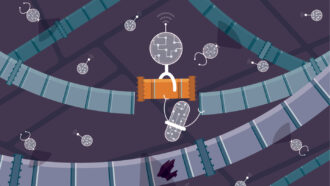antibodies: Any of a large number of proteins that the body produces from B cells and releases into the blood supply as part of its immune response. The production of antibodies is triggered when the body encounters an antigen, some foreign material. Antibodies then lock onto antigens as a first step in disabling the germs or other foreign substances that were the source of those antigens.
bacteria: (singular: bacterium) Single-celled organisms. These dwell nearly everywhere on Earth, from the bottom of the sea to inside other living organisms (such as plants and animals). Bacteria are one of the three domains of life on Earth.
cell: The smallest structural and functional unit of an organism. Typically too small to see with the unaided eye, it consists of a watery fluid surrounded by a membrane or wall. Depending on their size, animals are made of anywhere from thousands to trillions of cells. Most organisms, such as yeasts, molds, bacteria and some algae, are composed of only one cell. (in telecommunications) A technology that relies on a large number of base stations to relay signals. Each base station covers only a small area, which is known as a cell. Phones that rely on this system are typically referred to as cell phones.
germ: Any one-celled microorganism, such as a bacterium or fungal species, or a virus particle. Some germs cause disease. Others can promote the health of more complex organisms, including birds and mammals. The health effects of most germs, however, remain unknown.
immune: (adj.) Having to do with immunity. (v.) Able to ward off a particular infection. Alternatively, this term can be used to mean an organism shows no impacts from exposure to a particular poison or process. More generally, the term may signal that something cannot be hurt by a particular drug, disease or chemical.
immune system: The collection of cells and their responses that help the body fight off infections and deal with foreign substances that may provoke allergies.
infection: A disease that can spread from one organism to another. It’s usually caused by some type of germ.
symptom: A physical or mental indicator generally regarded to be characteristic of a disease. Sometimes a single symptom — especially a general one, such as fever or pain — can be a sign of any of many different types of injury or disease.
tonsils: These are pads of soft tissue at the back of the throat. They are part of the immune system, and produce antibodies to fight infection. Many people get infected tonsils removed, however, and seem no more vulnerable to infection afterward. The tonsils’ structure somewhat resembles that of lymph nodes. The tonsils’ outer pink cover is similar to that of the mouth’s lining.
virus: Tiny infectious particles consisting of genetic material (RNA or DNA) surrounded by protein. Viruses can reproduce only by injecting their genetic material into the cells of living creatures. Although scientists frequently refer to viruses as live or dead, in fact many scientists argue that no virus is truly alive. It doesn’t eat like animals do, or make its own food the way plants do. It must hijack the cellular machinery of a living cell in order to survive.
white blood cells: Blood cells that help the body fight off infection.









